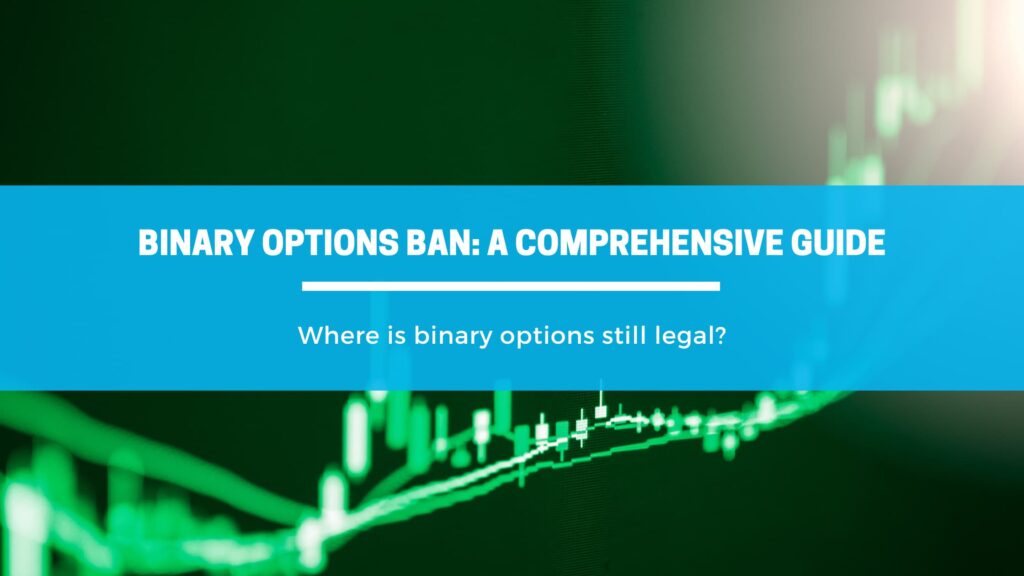Binary options are actually banned in several countries. Do you know why?
In the UK, at least, it is seen as a form of trading similar to fixed odds betting. This is because the value of binary options depends on the likelihood of an event happening.
Similarly, binary options are best for short-term trading. For brokers to turn over a decent profit, they need investors to lose more often than they win – this can be seen as encouraging addictive behavior, similar to gambling.
Summary: The European Securities and Markets Authority (ESMA) banned binary options trading for retail clients. The Australian regulator ASIC (Australian Securities & Investments Commission) considers binary options as high-risk and unpredictable and banned binary options for retail investors in 2021.
History of the Binary Trading (Binary Options Trading Firms)
Online trading enveloped the virtual world in its grasp somewhere during the early 2000s, and binary options trading was one of the most up-and-coming types. They came around at the same time as forex trading brokerages.
These brokerages would still not be half as regulated as they are today, meaning many of them could have side services like binary options trading. Somewhere around 2010, unregulated binary brokers could be found worldwide.
Internet-based trading platforms also skyrocketed in popularity and made binary trading a lot more accessible to people around the world. This is all around the early 2000s when the world was still reeling economically.
People were eager to try their luck at finding riches, and they certainly needed it. The catch of a trading option that would allow money to pile up just off of some predictions.
Binary Options Ban in the UK
The European Securities and Markets Authority temporarily banned binary options throughout the European Union in July 2018.
Understanding the impact of the ESMA’s restrictions on binary options trading is crucial. While it was illegal in Canada and the USA before this, Europe was a center for foreign exchange and binary options trading – the restrictions pulled the rug out from under the industry.
After the ESMA ban, countries like Australia also began to follow in the EU’s footsteps – which meant that globally, binary options trading was quite the hit. The ESMA came down so rough on binary options trading that even Contracts For Difference, which was spread-betting oriented, were also suspected to face regulation.
However, CFDs are a lot different from binary options – they are a much more legitimate, similar alternative.
Around 2017, the London Police received reports from over 700 people about losses they incurred while engaging in binary options trading. An estimated £18 million were lost.
In comparison to the aforementioned legitimate alternative, CFDs saw average losses of around £2,200 for traders.
The Binary Options Trading Scams
Binary options trading has become infamous for the number of scams and unregulated activity that goes on in the industry.
Altering options contracts just a few seconds before expiry after changing the prices of underlying securities to turn a loss instead of a profit was a common binary options fraud. They would credit customer accounts with different sums than what the trader was led to believe they won.
It lets the brokers take advantage of the big investments eager traders were making; while allowing them control over what happens behind the scenes, so they get the biggest take. Some brokers would disappear after receiving investment money.
Why Did the Ban Happen?
The ban from the ESMA happened due to binary options trading being inherently biased in the broker’s favor. This sounds good and fair, but binary options trading inherently depends on whether or not a trader can generate losing trades for brokers to profit before the binary option expires.
Forex trading was still tightly regulated for both the market makers and those dealing, but binary options trading did not get these regulations. Binary options trading platforms were seen as people with incredibly effective business formulas and market makers who were only out to get their cut.
Binary options trading was also still seen as a type of theoretical asset pricing. This, combined with how many binary options traders and brokers were engaging in scams or unregulated activity, left a bad enough impression.
The payout structure for binary options trading was also ruled entirely in the broker’s favor. It was impossible for brokers not to make money off of it.
If you guess correctly, they enjoy a cut of the profits. If you guess wrong, they keep your initial investment along with the profits from the payout ratio.
The EU was not the only one that placed a temporary ban on binary options trading activity – even advertisements on top social media platforms or search engines were banned if they were related to options trading.
Likewise, the U.S. Commodity Futures Trading Commission (CFTC) warns that some binary options Internet-based trading platforms may advertise a higher average return on investment than what customers should expect, given the payout structure.

Understanding Binary Trading: The Faults
Binary options brokers would sell underlying assets at a fixed strike price – the general concept was that there was an expiration date tied to these assets. If a trader could correctly predict market movements, they would make a profit.
However, this only sounds good in hindsight. Binary options trading is heavily regarded as a no-nonsense industry where in-depth knowledge of the market, political factors, currency, and fluctuations in market behavior were necessary to make any kind of money.
These things are almost entirely impossible to predict, and any experienced or patient trader would tell their customers or potential investors the same. Binary options trading heavily relied on capturing eager, young traders into their lucrative offers and schemes.
The allure was that the path to riches could be paved immediately with just one right prediction. In truth, traders would often get a slice of the original investment even if they did guess right, and they did not guess right often enough for it to matter at all.
Essentially, it was another rich man’s game. You could only truly profit if you had the start-up capital to make serious investments and trade binary options. Very few people possessed that kind of capital.
FCA regulations also cracked down on binary options that were securitized. This is something that the ESMA left. However, the FCA regulations are permanent ones.
Binary options were seen as bonafide gambling products simply wearing the cover of a financial instrument. They were causing investors to lose millions regularly and were not at all a fair trade.
Still, there was definitely money to be made in binary options trading firms. It required a lot of patience and knowledge on the trader’s part, it was possible to hit it big, and these success stories fueled the allure of a binary options broker tenfold when they were still new.
Conclusion
The way the binary options market operates, it can seem incredibly daunting Working with a regulated binary trading broker will assure you a much safer, legitimate experience.
Still, it must be said that the industry has died down due to all the regulations and stigma surrounding it. Most people caught onto the scheme early on, and soon enough, it made international news. As opposed to forex trading, which is still a thriving industry.
If you are looking to take part in the binary industry and make a tidy sum for yourself, there is money there, but getting to it is a lot trickier than it seems. Brokers are set to work against you – it’s just in their personal interest.

